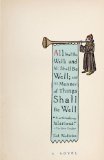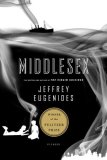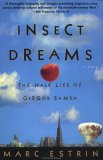Summary | Excerpt | Reading Guide | Reviews | Beyond the book | Read-Alikes | Genres & Themes | Author Bio

The biblical idea that there exists "nothing new under the sun"
frequently applies to the world of adult fiction. Familiar or foundational plots
are made fresh through detail, setting, the author's unique voice and other
elements of noteworthy novels. All Shall Be Well; and All Shall Be Well; and
All Manner of Things Shall Be Well, Tod Wodicka's first book, seems, at
first read, to defy this concept. From the opening pages, taken from the
writings of Hildegard von Bingen, to the masterful conclusion that blends back
into another of the anchorite's diary excerpts, one feels that this story might
just be the one to fly in the face of this precept that all human ideas and
circumstances are recycled, repeated. However, underneath the peculiar
characters and layers of dark comedy that feed this story, hides another one of
those common, "nothing new under the sun," themes: the foibles and ecstasies of
familial love.
Wodicka's tale is, without a doubt, unusual: a man, so obsessed with reenacting
the middle ages that his ability to function and form relationships in modern
society is severely impaired, tries to reconnect with his beloved son after a
family fallout. A family crisis has peaked after the death of the man's wife,
though one comes to realize that division has been brewing for years. Burt
Hecker – husband, father, failed history teacher and co-owner of the Mansion Inn
Bed and Breakfast in Queens Falls, New York – finds himself so disconnected from
reality and those he loves that he is willing to make some extreme decisions in
an effort to repair the damage.
Burt Hecker is a protagonist that sticks with his reader. After the novel is
completed, Burt's troubles, along with his tunics and home-brewed mead, lodge in
one's mind in a slightly pesky way. "Am I ever as blind to my family's needs as
this guy?" and other such questions seep into one's subconscious after spending
time with Burt and his strange circle. Burt's love for his dying wife is
demonstrated in absurd but heartbreaking details; his relationship with his two
children is complicated and messy; and his closest friend is a lawyer, a
maternal woman who is successful in her vocation but privately lonely and
frustrated. The rest of Burt's world revolves around his attempts to live an
accurate medieval life in 20th century America and his love for the
activities and members of the reenactment society that he founded, the
Confraternity of Times Lost Regained.
Despite light moments and clever demonstrations of culture clash, Wodicka's
novel is not a light read. His themes are weighty, his research is thorough and
his characters are burdened by their personal and familial histories. Readers
may guess that the struggles described in the book's pages are a reflection of
its author. Wodicka admits to creating Burt Hecker at least partially out of the
need to purge himself of similar tendencies before the birth of his own child.
Though Wodicka himself is not an historical re-enactor, he also acknowledges
amassing an overwhelming amount of research in preparation for the novel, much
if which he never included in the actual text. Only an extremely talented writer
could make a success of the mixture of plot, characters and subject matter in
All Shall Be Well. Wodicka's story is a rare and noteworthy one, a
cautionary tale rooted in a singular, yet familiarly dysfunctional, family.
![]() This review was originally published in The BookBrowse Review in April 2008, and has been updated for the
January 2009 edition.
Click here to go to this issue.
This review was originally published in The BookBrowse Review in April 2008, and has been updated for the
January 2009 edition.
Click here to go to this issue.

If you liked All Shall Be Well; And All Shall Be Well; And All Manner of Things Shall Be Well, try these:

by Jeffrey Eugenides
Published 2003
To understand why Calliope is not like other girls, she has to uncover a guilty family secret, and the astonishing genetic history that turns Callie into Cal. Lyrical and thrilling, Middlesex is an exhilarating reinvention of the American epic.

by Marc Estrin
Published 2003
"This is a grand comic opera starring a meditative cockroach scuttling through the corridors of power at the fulcrum of the 20th century. An impressive debut, notable for a generous sense of fun."
Your guide toexceptional books
BookBrowse seeks out and recommends the best in contemporary fiction and nonfiction—books that not only engage and entertain but also deepen our understanding of ourselves and the world around us.